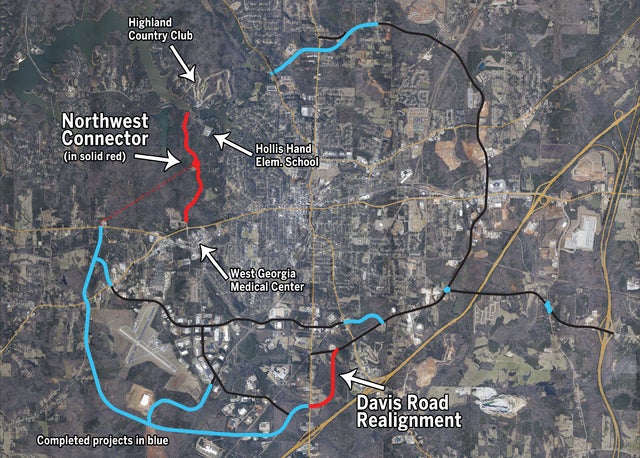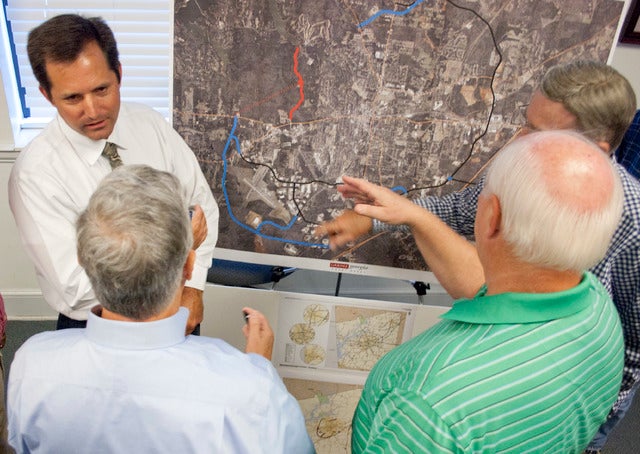LaGrange residents concerned about planned new road
Published 12:00 am Thursday, August 27, 2015


LaGRANGE — A joint city-county proposal to build a throughway from West Georgia Medical Center to Highland Country Club drew criticism and questions from area residents at a City Council meeting Tuesday.
More than 60 people came to hear about a planned 2-mile route that would connect Vernon Road at Medical Park Drive with Country Club Road at the entrance of the Highland Country Club community.
Residents who live in the area are concerned about the intended road — and what may come after it. Dubbed the Northwest Connector, they worry it could lead to the eventual completion of the LaGrange bypass system through land surrounding Highland Country Club, its 18-hole golf course and at least one property valued at nearly $2 million.
City and county officials said they have no plans at this time for any such road. The county’s road engineer, James Emery, told residents the proposed connector is not part of the bypass — for now — and is considered a connector because it does not link with the existing bypass.
Much of the LaGrange bypass system is already finished, and a map shows the proposed Northwest Connector leaving only a few miles of unplanned bypass remaining to complete the loop.
Mayor Jim Thornton, along with Emery and city roads engineer David Brown, emphasized the city currently has no plans to build a road through the Highland Country Club community, but concerned residents had their own take.
“At some point, the only way that bypass could be connected, even though there are no plans, would be through the country club,” one resident told city officials during the council’s meeting.
“It’s not a bypass if it doesn’t go all the way around,” a woman said.
Thornton called the residents’ concerns “legitimate,” and said he believes people are less concerned about the connector, but more with what may come after it.
City Manager Tom Hall called a roadway through the country club community “not practical,” but also said the same of a multimillion-dollar plan involving a bridge crossing West Point Lake to connect Mooty Bridge and Cameron Mill roads. The county’s master transportation study calls for such a project, although Emery is quick to note he and other road engineers call those plans “crayon lines on a county map,” because such projects are only in the imaginative phases, Emery said.
At this time, the county doesn’t need a road connecting Country Club Drive and Cameron Mill Road to Mooty Bridge Road, Emery said.
“We’re not hearing any great need for a bypass road, especially between Mooty Bridge Road and Cameron Mill Road,” he said. “If there’s not a need, then we wouldn’t build one. There’s no need to have a complete loop. In my mind, every road you build, you build because of a need.”
One resident asked Emery what could create a need to build a route connecting the two roads.
“Basically, it comes down to traffic demand,” Emery said. “Traffic demand is generated by residential growth and traffic generators, both on the industrial side and commercial side. … If you have something like that, if there’s a change in traffic patterns, there could be a warrant in the future, but we don’t see that today. That’s crystal ball speculation.”
Some residents are worried that in their crystal balls, they see a real estate development in a large parcel of land northeast of Highland County Club west of Mooty Bridge Road; they may have reason to be uneasy. A 757-acre plot of wooded land valued by the county property appraiser at $7.6 million sits behind the banks of West Point Lake, is already zoned residential and is owned by the Newman Development Corporation.
The corporation is registered with the Georgia Secretary of State’s Office and lists Nancy Durand, who, along with her husband Dan Durand, co-founded DanRic Homes, a residential real estate developer “proudly serving East Alabama and West Georgia since 1974. With over 2,500 homes built in 100 neighborhoods, we are a well-established builder …,” according to DanRic’s website.
A call for comment Wednesday to Nancy Durand’s DanRic office in LaGrange was not returned by press time today.
Dean Thompson, who lives in the vicinity of the proposed connector, said he’s curious to know about what led city and county officials to plan the connector.
“I’ve heard some of the general comments, but I think it would be helpful to know what information led you to make that red line on that chart,” he asked Emery.
Emery pointed Thompson to the county’s master transportation plan, formally called the Multi-Modal Transportation Study. The 159-page document was prepared for the Georgia Department of Transportation and was released in November 2006; it has not been updated since. It offers detailed data on everything from proposed sidewalks and bicycle trails to bypass systems and railroads. He also offered anecdotal evidence.
“If you’ve ever traveled north on Jefferson Street and you pull up to Vernon and try to turn left, you’re probably going to be sitting there a long time,” he said. “That’s one of the big bottle necks in Troup County. … All of the east-west traffic that has to flow through town without bypass roads has to pass through those two lanes — and there are only two of them. They’re flowing about as fast as they can all the time. Roads like this (the connector and bypasses) take traffic off of that road and many others.”
The 2006 transportation study classifies the two-lane stretch of Vernon Road between LaGrange College and West Georgia Medical Center as handling more traffic than it was “designed to handle, resulting in extreme delays.” The study gave the area its lowest possible traffic rating.
The construction of the Northwest Connector will help ease some of the traffic on Vernon Road, Emery said, and he argues there couldn’t be a better time to do it.
“It’s about time right now because we’ve gotten so much cooperation from the city, the county and the property owners on this project. It’s (a project) that works right now,” he said.
City and county officials plan to build the Northwest Connector on two parcels of land north of Vernon Road and west of Country Club Road; they are owned by the Callaway Land Trust. The eastern parcel is 415 acres, zoned residential and valued at $1.2 million. The larger western parcel includes 1,266 acres of agriculturally zoned land valued at $5.9 million.
The land trust — along with two other Callaway-related trusts — is donating the right of way for the road to be built, according to Speer Burdette, president and general manager of the Callaway Foundation.
The foundation has also pledged $2 million toward the connector’s construction, said Burdette, who also sat on the advisory panel of the 2006 transportation study. County-wide special purpose, local option sales taxes approved by voters would pay for the rest of the road. The project is currently in its design phase and no groundbreaking date has been set, nor has a cost been estimated, Emery said.
A second road that would link the connector with Pegasus Parkway — which is part of the bypass system — is in its early planning phases, Emery said.
Burdette, like the city and county officials, thinks any chance of a bypass road running through the Highland Country Club community is slim.
“You never know what’s going to happen years down the road, but I don’t think it’s something that we’ll see in our lifetimes, if at all,” he said.





